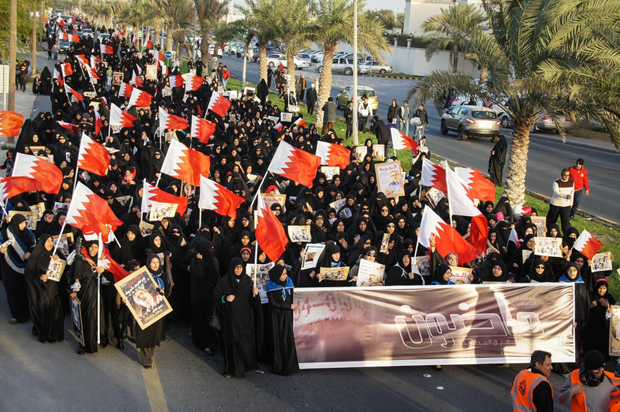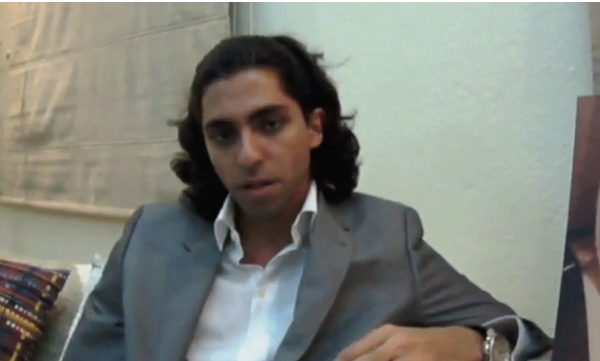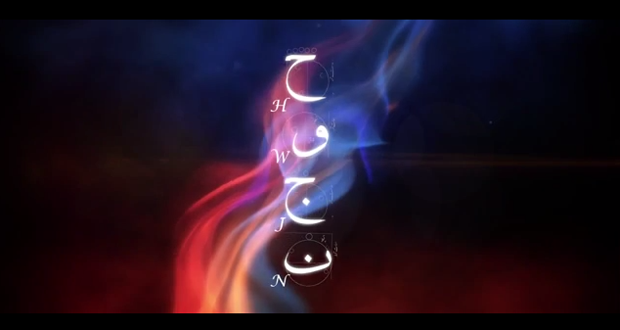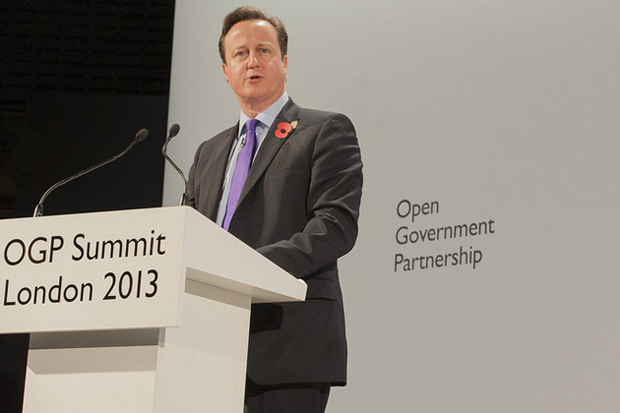21 Jan 2014 | Middle East and North Africa, News

A pro-democracy protest in Bahrain, where activists have been jailed for inciting protests through their online activities (Photo: Moh’d Saeed / Demotix)
One hundred and forty characters are all it takes.
Twitter users from Marrakech to Manama know—call for political reforms, joke about a sensitive topic, or expose government abuse and you could end up in jail. Following the overthrow of Muammar Qaddafi and Zine el-Abidine Ben Ali, authorities in Libya and Tunisia unblocked hundreds of websites and dismantled the state surveillance apparatus. But overall, internet freedom in the region has only declined in the three years since the Arab Spring as authoritarian leaders continue to crack down on any and all threats to their ever-tenuous legitimacy.
As the online world has become a fundamental part of Arab and Iranian societies, leaders are waking up to the “dangers” of social media and placing new restrictions on what can be read or posted online. This shift has been most marked in Bahrain, one of the most digitally-connected countries in the world. After a grassroots opposition group took to the streets to demand democratic reforms, authorities detained dozens of users for Twitter and Facebook posts deemed sympathetic to the cause. Similarly, several prominent activists were jailed on charges of inciting protests, belonging to a terrorist organization, or plotting to overthrow the government through their online activities.
Conditions in Egypt—where social media played a fundamental role in mobilising protesters and documenting police brutality—continued to decline over the past year. In only the first six months of Mohammad Morsi’s term, more citizens were prosecuted for “insulting the office of the president” than under Hosni Mubarak’s entire 30-year reign. Cases have now been brought against the same bloggers and activists that were instrumental in rallying the masses to protest against Mubarak (and later Morsi) in Tahrir Square, while countless others were tortured by Muslim Brotherhood thugs or state security forces.
Even in the moderate kingdoms of Morocco and Jordan, state officials are looking to extend their existing controls over newspapers and TV channels to the sphere of online media. Ali Anouzla, a website editor in Morocco, faces terrorism charges in the latest attempt by the state to silence him and his popular online newspaper, Lakome. Access to independent journalism is even worse in Jordan, where over 200 news sites have been blocked for failing to obtain a press license. The government instituted burdensome requirements in a bid to deter any views that counter the state-sponsored narrative.
If governments are beginning to pay attention, it is because online tools for social mobilisation and individual expression are having a profound impact. Social media accounts were set up for every candidate in Iran’s 2013 presidential elections, despite the fact that Twitter, Facebook, and YouTube are all blocked within the country. In Saudi Arabia – which now boasts the highest Twitter and YouTube usage per capita of any country in the world – social media has been used to promote campaigns for women’s right to drive, to highlight the mistreatment of migrant workers, and to debate sensitive subjects such as child molestation. Citizen journalism was vital in documenting chemical weapons use in Syria, and a new online platform alerts local residents of incoming scud missiles. Nonetheless, Iran, Saudi Arabia, and Syria rank as some of the least free countries in the world in terms of internet freedom according to Freedom House’s Freedom on the Net study.
Remarkably, the country that has made the most positive strides over the past three years, was once among the most repressive online environments in the region – Tunisia. Protest videos from the town of Sidi Bouzid led to an intense crackdown on online dissidents by the Ben Ali regime. Digital activists even enlisted the help of Anonymous, the hacktivist group, to rally international media attention, provide digital security tools, and bring down government websites. Since then, Tunisian authorities have ceased internet censorship, reformed the regulatory environment, and ceded control of the state-owned internet backbone. Tunisia is now the only country in the region to have joined intergovernmental group the Freedom Online Coalition.
So while the snowball effect of social media contributed to the overthrow of several despots, many of the region’s internet users conversely find themselves in more restrictive online environments than in January 2011. Authoritarian governments now know exactly what the face of revolution looks like and, over the past three years, have shown their commitment to counter the internet’s potential to empower citizens and mobilise opposition. Users in liberal democracies may joke about the insignificance of “liking” a post on Facebook or uploading a video to YouTube, but in a region where your social media activity can make you an enemy of the state, 140 characters can lead to serious repercussions.
This article was posted on 21 January 2014 at indexoncensorship.org
2 Jan 2014 | News, Politics and Society
Activists are continually harassed and punished for standing up and speaking out about social and political issues they feel are unjust in their country. Here are five activists whose government didn’t quite like what they had to say.

Raif Badawi- Saudi blogger punished after calling for ‘day of liberalism’
It would seem absurd to most people that “liking” a Facebook page could land you in jail. However, that was one of the crimes charged against Raif Badawi after he “liked” an Arab Christian page on the social networking site. The young co-founder of the Liberal Saudi Network, a website that has since been shut down, was arrested in June 2012 for “insulting Islam through electronic channels”, including insulting Islam and portraying disobedience.
In January, a court had refused to hear apostasy charges against Badawi, concluding that there was no case. Apostasy carries the death sentence in Saudi Arabia. He has since been sentenced to 600 lashes and seven years in jail.
Eskinder Nega- Ethiopian blogger
Eskinder Nega is a well-known name in Ethiopia whose journalism has been recognised by major organisations globally; he is currently serving 18 years in jail for supposedly violating the country’s anti-terrorism legislation.
Nega was arrested in September 2011 after publishing, somewhat ironically, an article criticising his government’s detainment of journalists as suspected terrorists, in particular the arrest of Ethiopian actor and government critic Debebe Eshetu . Along with 23 others, he was then convicted of having links with US-based opposition group Ginbot Seven, an organisation Ethiopia had recently added to its list of terrorists.
This is not the first time Nega has been imprisoned for speaking out in defense human rights. Meles Zenawi’s government handed him a total of eight sentences over the past decade. He is also not the only journalist to face prosecution under the Ethiopian government. According to the Amnesty Annual Report 2013 a number of journalists and political opposition members were sentenced to lengthy prison terms on terrorism charges for calling for reform, criticizing the government, or for links with peaceful protest movements. Much of the evidence used against these individuals consisted of examples of them exercising their rights to freedom of expression and association.
Shi Tao- Stung by Yahoo in China
2013 was a good year for Shi Tao; the Chinese reporter was finally released after documents leaked by Yahoo to his government saw him spend the past eight and a half years behind bars.
Tao sent details of a government memo about restrictions on news coverage of the Tiananmen Square massacre anniversary to a human rights forum in the United States. He was subsequently arrested in 2004 and sentenced the following year charged with disclosing state secrets.
Reporters Without Borders said the branch of Yahoo in Hong Kong assisted the Chinese government in linking Shi Tao’s email account to the message containing the information he had sent abroad. Yahoo was heavily criticised at the time by human rights activists and U.S. legislators with Jerry Yang, co-founder of Yahoo, publicly apologising to Shi Tao’s family.
Tao was released 15 months before the end of us 10 year restriction. It is unclear why his early release occurred.
Ngo Hao- Vietnamese blogger
You’re never too old to go to prison as 65-year-old activist Ngo Hao found out after he was handed 15 year sentence earlier this year on charges of attempting to overthrow the Vietnamese government. Accused of writing and circulating false and defamatory information about his government and its leaders, Hao was arrested in February. Further accusations included a peaceful attempt to instil an Arab Spring-style revolution and of working with dissident group Bloc 8406.
Reporters Without Borders criticised Hao’s trial for a lack of his right to a fair defence and the unwillingness to allow any family members to attend the hearing asides from his son.
Just weeks before an appeal court in the south of the country also sentenced two bloggers, Nguyen Phuong Uyen and Dinh Nguyen Kha. This takes the estimated total of bloggers behind bars in Vietnam to 36.
Jabeur Mejri- Tunisian blogger seven and a half years for posting on Facebook
After the 2011 Arab Spring many Tunisian bloggers were able to express themselves freely; a stark contrast to the censorship, arrest and jail they had come to expect under the rule of former President Ben Ali. One such blogger was Jabeur Mejri who, in March 2012, posted a cartoon of the Prophet Mohamed on his Facebook page, a post that sentenced the blogger to over seven years in jail for “attacking sacred values through actions or words” and “undermining public morals”.
The rise of ‘opinion trials’ has become a concern to many with Mejri being the first person sent to jail under the procedure. Lina Ben Mhenni told Amnesty International: “You can go to jail for a word or an idea. ‘Opinion trials’ have become part of our daily lives. As in many other countries, Tunisia’s taboo topics are religion and politics. You can’t criticize the government in general or the Islamists in particular.”
2 Dec 2013 | Middle East and North Africa, News, Saudi Arabia

A shot from the YouTube trailer for H W J N (Image: Yatakhayaloon Sci Fi/YouTube)
A top selling Saudi Arabian science fiction novel has been removed from book shops across the country.
Last Tuesday (26 Nov) representatives from the country’s Commission for the Promotion of Virtue and Prevention of Vice — the Haya’a — raided several bookshops selling the novel H W J N by Ibraheem Abbas and Yasser Bahjatt’s, demanding it’d be taken off the shelves. H W J N is a “fantasy, sci-fi and romance” novel about a genie who falls in love with a human, and is a best-seller in Saudi Arabia.
Our source, who wishes to remain anonymous, says the book is charged with “blasphemy and devil-worshiping”. They add that the ban appears to stem from a Facebook post accusing the novel of “referencing jinn [genies] and leading teenage girls to experiment with Ouija boards”.
An official, handwritten letter was delivered to at least one book store from the government body. It stated, among other things that: “We purchased one copy of the book to review and we have counted 73 copies of H W J N by Ibarheem Abbas at your shop. You are requested not to dispose of, sell, or return these books until further notice.” The owners were also asked to “follow up” on this with the Haya’a the following day (27 Nov).
The book is reportedly still available in smaller shops, and the English version is also reportedly available in a number of stores. It is so far unknown what actions, if any, are being taken against the authors.
This article was published on 2 Dec 2013 at indexoncensorship.org
1 Nov 2013 | News, United Kingdom

State control of the press is hot topic. On Wednesday, Queen Elizabeth signed off a Royal Charter which gives politicians a hand in newspaper regulation. This come after David Cameron criticised the Guardian’s reporting on mass surveillance, saying “If they don’t demonstrate some social responsibility it will be very difficult for government to stand back and not to act”.
But what does state control of the press really look like? Here are 10 countries where the government keeps a tight grip on newspapers.
Bahrain
Press freedom ranking: 165
The tiny gulf kingdom in 2002 passed a very restrictive press law. While it was scaled back somewhat in 2008, it still stipulates that journalists can be imprisoned up to five years for criticising the king or Islam, calling for a change of government and undermining state security. Journalists can be fined heavily for publishing and circulating unlicensed publications, among other things. Newspapers can also be suspended and have their licenses revoked if its ‘policies contravene the national interest.’
Belarus
Press freedom ranking: 157
In 2009 the country known as Europe’s last dictatorship passed the Law on Mass Media, which placed online media under state regulation. It demanded registration of all online media, as well as re-registration of existing outlets. The state has the power to suspend and close both non-registered and registered media, and media with a foreign capital share of more than a third can’t get a registration at all. Foreign publications require special permits to be distributed, and foreign correspondents need official accreditation.
China
Press freedom ranking: 173
The country has a General Administration of Press, Publication, Radio, Film and Television and an army official censors dedicated to keeping the media in check. Through vaguely worded regulation, they ensure that the media promotes and toes the party line and stays clear of controversial topics like Tibet. A number of journalists have also been imprisoned under legislation on “revealing state secrets” and “inciting subversion.”
Ecuador
Press freedom ranking: 119
In 2011 President Rafael Correa won a national referendum to, among other things, create a “government controlled media oversight body”. In July this year a law was passed giving the state editorial control and the power to impose sanctions on media, in order to stop the press “smearing people’s names”. It also restricted the number of licences will be given to private media to a third.
Eritrea
Press freedom ranking: 179
All media in the country is state owned, as President Isaias Afwerki has said independent media is incompatible with Eritrean culture. Reporting that challenge the authorities are strictly prohibited. Despite this, the 1996 Press Proclamation Law is still in place. It stipulates that all journalists and newspapers be licensed and subject to pre-publication approval.
Hungary
Press freedom ranking: 56
Hungary’s restrictive press legislation came into force in 2011. The country’s media outlets are forced to register with the National Media and Infocommunications Authority, which has the power to revoke publication licences. The Media Council, appointed by a parliament dominated by the ruling Fidesz party, can also close media outlets and impose heavy fines.
Saudi Arabia
Press freedom ranking: 163
Britain isn’t the only country to tighten control of the press through royal means. In 2011 King Abdullah of Saudi Arabia amended the media law by royal decree. Any reports deemed to contradict Sharia Law, criticise the government, the grand mufti or the Council of Senior Religious Scholars, or threaten state security, public order or national interest, are banned. Publishing this could lead to fines and closures.
Uzbekistan
Press freedom ranking: 164
The Law on Mass Media demands any outlet has to receive a registration certificate before being allowed to publish. The media is banned from “forcible changing of the existing constitutional order”, and journalists can be punished for “interference in internal affairs” and “insulting the dignity of citizens”. Foreign journalists have to be accredited with the Ministry of Foreign Affairs.
Vietnam
Press freedom ranking: 172
The 1999 Law on Media bans journalists from “inciting the people to rebel against the State of the Socialist Republic of Vietnam and damage the unification of the people”. A 2006 decree also put in place fines for journalists that deny “revolutionary achievements” and spread “harmful” information. Journalists can also be forced to pay damages to those “harmed by press articles”, regardless of whether the article in question is accurate or not.
Zimbabwe
Press freedom ranking: 133
The country’s Access to Information and Protection of Privacy Act gives the government direct regulatory power over the press through the Media and Information Council. All media outlets and journalists have to register with an obtain accreditation from the MIC. The country also has a number of privacy and security laws that double up as press regulation, The Official Secrets Act and the Public Order and Security Act.
This article was originally posted on 1 Nov 2013 at indexoncensorship.org.




